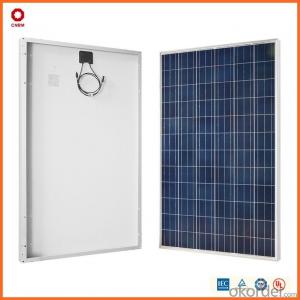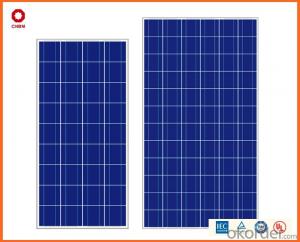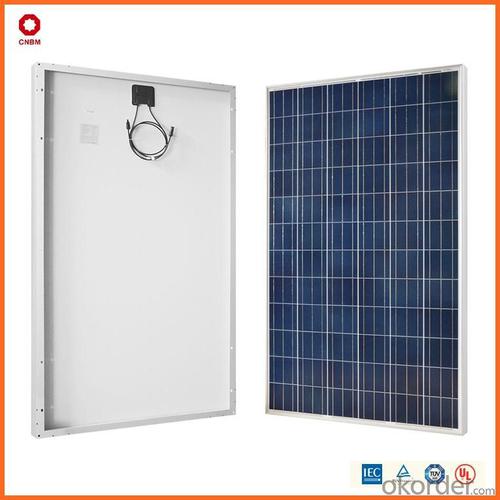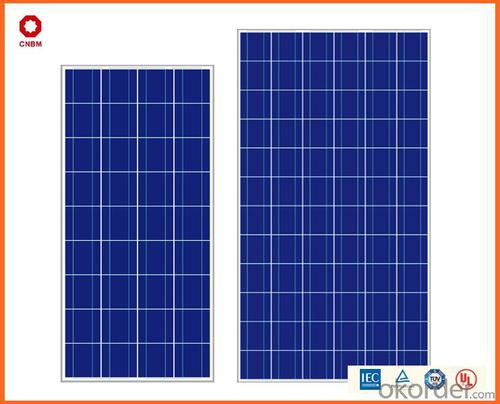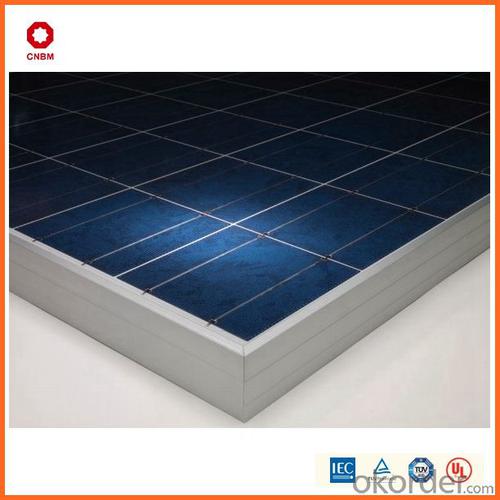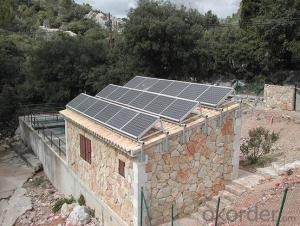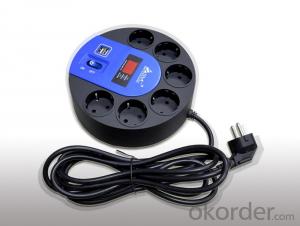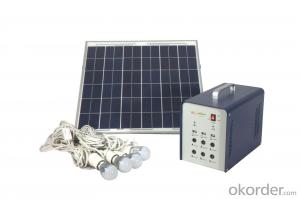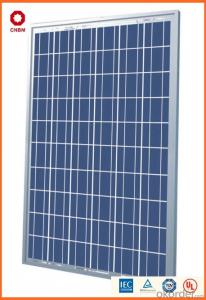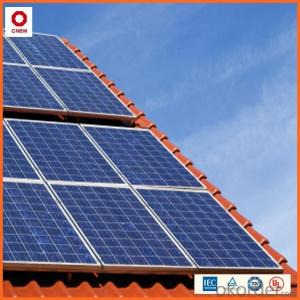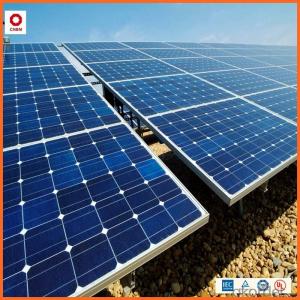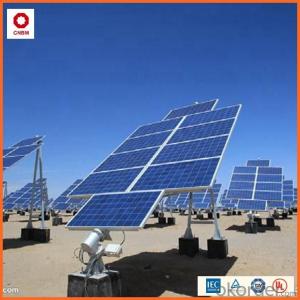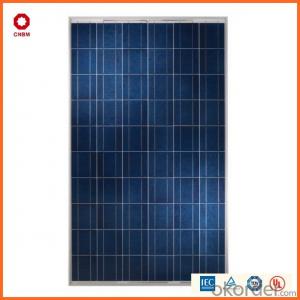Solec Solar Energy Systems - A Grade 255W Poly Solar Panel Hot on Sale at USD0.45/W
- Loading Port:
- China main port
- Payment Terms:
- TT OR LC
- Min Order Qty:
- 1 watt
- Supply Capability:
- 10000000 watt/month
OKorder Service Pledge
OKorder Financial Service
You Might Also Like
Product Description:
Hot Sale !!! Quality and Safety of 245w-320w Poly Solar Panel
1. Rigorous quality control meets the highest international standards.
2. High-transmissivity low-iron tempered glass, strong aluminium frame.
3. Using UV-resistant silicon.
4. IS09001/14001/CE/TUV/UL
Warranties of 245w-320w Poly Solar Panel
1. 10 years limited product warranty
2. 15 years at 90% of the minimal rated power output
3. 25 years at 80% of the minimal rated power output
Technical date of 245w-320w Poly Solar Panel
ITEM NO.: | Mono 125*125 cell ,36pcs . Power range from 80Wp-100Wp | ||||||||
Maximum Power(W) | 80 | 85 | 90 | 95 | 100 | ||||
Optimum Power Voltage(Vmp) | 17.81 | 17.89 | 17.94 | 17.99 | 18.06 | ||||
Optimum Operatige Current(Imp) | 4.78 | 4.91 | 5.12 | 5.35 | 5.59 | ||||
Open Circuit Voltage(Voc) | 21.98 | 22.05 | 22.14 | 22.28 | 22.45 | ||||
Short Circuit Current(Isc) | 4.95 | 5.15 | 5.36 | 5.65 | 5.84 | ||||
Solar Cell: | 125*125 Mono | ||||||||
Number of Cell(pcs) | 4*9 | ||||||||
Brand Name of Solar Cells | JA Cell, Bluesun Cell | ||||||||
Size of Module(mm) | 1580*808*35 | ||||||||
Caple & Connector Type | Pass the TUV Certificate | ||||||||
Frame(Material Corners,etc.) | Aluminium-alloy | ||||||||
Backing (Brand Type) | TPT | ||||||||
Cell Efficiency for 100W(%) | 15.8% | ||||||||
Weight Per Piece(KG) | 12.0KG | ||||||||
FF (%) | 70-76% | ||||||||
Junction Box Type | Pass the TUV Certificate | ||||||||
Tolerance Wattage(e.g.+/-5%) | ±3%, or 0-3% | ||||||||
Front Glass Thikness(mm) | 3.2 | ||||||||
Temperature Coefficients of Isc(%) | +0.04 | ||||||||
Temperature Coefficients of Voc(%) | -0.38 | ||||||||
Temperature Coefficients of Pm(%) | -0.47 | ||||||||
Temperature Coefficients of Im(%) | +0.04 | ||||||||
Temperature Coefficients of Vm(%) | -0.38 | ||||||||
Temperature Range | -40°C to +85°C | ||||||||
Surface Maximum Load Capacity | 2400Pa | ||||||||
Allowable Hail Load | 23m/s ,7.53g | ||||||||
Bypass Diode Rating(A) | 12 | ||||||||
Warranty | 90% of 10 years,80% of 25 years. | ||||||||
Standard Test Conditions | AM1.5 1000W/ 25 +/-2°C | ||||||||
Packing | carton or pallet | ||||||||
1*20' | 25 Pallets / 450pcs | ||||||||
1*40'STD | 25 Pallets / 100pcs | ||||||||
Features of our products:
• High conversion efficiency mono/poly-crystalline amorphous silicon solar cells
• Modules incorporate high performance bypass diodes to minimize the power drop caused by shading
• High transmittance, low-iron tempered glass
• High performance EVA encapsulant to prevent destroying and water.
• AI frame: without screw, corner connection. 8 holes on the frame can be installed easily
• Good performance of preventing from atrocious weather such as wind and hails
• Certifications: CE IEC TUV VDE UL, Class I
• 10 years 90% power output warranty

Shipping of 245w-320w Poly Solar Panel
By Sea | Delivery from Shanghai or Ningbo seaport |
By Air | Departure from Shanghai Pudong Airport |
By Express | Post by DHL, EMS, UPS, TNT. |
- Q: Can solar energy systems be used in disaster relief efforts?
- Yes, solar energy systems can be used in disaster relief efforts. In fact, they have become increasingly popular and valuable in such situations. When disasters strike, they often disrupt the electricity supply, leaving affected areas without power for days or even weeks. This lack of electricity hampers relief efforts, making it difficult to provide basic necessities like lighting, medical care, communication, and clean water. Solar energy systems, on the other hand, can provide a reliable and sustainable source of power in these situations. They consist of solar panels that convert sunlight into electricity, which can be used to power various devices and appliances. These systems can be quickly deployed to disaster-stricken areas, providing immediate access to electricity without relying on traditional power grids. There are several advantages to using solar energy systems in disaster relief efforts. Firstly, solar power is renewable and abundant, ensuring a continuous supply of electricity even during prolonged emergencies. Secondly, solar energy systems are generally low maintenance, reducing the need for constant fuel supply or repairs. This makes them more cost-effective and reliable in disaster-prone areas. Solar energy systems can be used in a variety of ways during disaster relief efforts. They can power mobile charging stations, allowing people to charge their phones and stay connected with their loved ones. Solar-powered lighting can be used to illuminate temporary shelters, hospitals, and walkways, improving safety and security for victims and aid workers alike. Solar energy can also be used to power water purification systems, ensuring a supply of clean drinking water in areas where water infrastructure has been damaged or contaminated. Furthermore, solar energy systems can be integrated into existing relief infrastructure. For example, solar panels can be installed on the roofs of hospitals, schools, and community centers, ensuring a reliable source of electricity for critical operations. This reduces the dependence on diesel generators or other fossil fuel-powered alternatives, which are often expensive, noisy, and emit harmful pollutants. In summary, solar energy systems are highly beneficial in disaster relief efforts. They provide a sustainable and reliable source of power, enabling essential services and improving the overall relief operations. As the world faces more frequent and severe natural disasters, the use of solar energy systems in disaster relief will continue to grow in importance.
- Q: How long does it take to recoup the cost of installing a solar energy system?
- The time it takes to recoup the cost of installing a solar energy system varies depending on several factors such as the size of the system, the location, available incentives, energy usage, and electricity rates. On average, homeowners can expect to recoup their investment within 5 to 10 years. However, with the decreasing costs of solar panels and the availability of government incentives, some homeowners have reported recouping their costs within as little as 3 to 4 years.
- Q: Can solar energy systems be used for powering agricultural irrigation systems?
- Yes, solar energy systems can indeed be used to power agricultural irrigation systems. Solar panels can generate electricity to power pumps and other equipment needed for irrigation. This allows farmers to harness renewable energy and reduce reliance on fossil fuels, making it an environmentally friendly and cost-effective solution for irrigation in remote areas.
- Q: What is the role of solar tracking systems in maximizing solar energy capture?
- The role of solar tracking systems in maximizing solar energy capture is to continuously orient solar panels or mirrors towards the sun, ensuring that they receive maximum sunlight throughout the day. By tracking the sun's movement, these systems optimize the angle and position of the solar panels, which results in a higher efficiency of solar energy absorption. This technology helps increase the overall energy output and improves the return on investment of solar power systems.
- Q: Can solar energy systems be used in areas with limited space for ground-mounted installations?
- Solar energy systems can still be used in areas with limited ground space. Instead of traditional ground-mounted installations, alternative options like roof-mounted solar panels or vertical installations can be utilized. Roof-mounted solar panels are particularly popular for homes and buildings with limited ground space. They make use of the available roof area to capture sunlight and generate electricity. Another option is vertical solar panel installations, where panels are mounted on walls or other structures. These vertical installations allow for solar energy generation in tight spaces or even on building facades. Therefore, even in places with limited ground space, solar energy systems can still be effectively utilized through alternative mounting options.
- Q: How long do solar energy systems typically last?
- Solar energy systems typically last for about 25 to 30 years.
- Q: Can a solar energy system be connected to the grid?
- Yes, a solar energy system can be connected to the grid. In fact, grid-connected solar systems are quite common and allow for excess electricity generated by the solar panels to be fed back into the grid, earning credits or payments through net metering programs. This helps in reducing reliance on traditional energy sources and contributes to the overall stability and sustainability of the grid.
- Q: Can solar energy systems be used for lighting outdoor spaces?
- Certainly, outdoor spaces can be illuminated using solar energy systems. Typically, solar lighting systems comprise solar panels, batteries, and LED lights. Sunlight is collected by the solar panels and converted into electricity, which is then stored in the batteries. The LED lights are powered by the stored electricity and provide illumination for outdoor areas like gardens, pathways, patios, or parks. There are various advantages to using solar-powered outdoor lighting systems. Firstly, they are eco-friendly since they do not emit any greenhouse gases during operation. Moreover, they do not rely on an external power source, making them independent of the electrical grid. This makes them particularly suitable for remote or off-grid locations where connecting to the grid may be challenging or expensive. Solar outdoor lighting systems are also cost-effective in the long term. Although the initial installation cost may be higher compared to traditional lighting systems, there are no monthly electricity bills associated with solar lighting. Furthermore, these systems have minimal maintenance requirements as the solar panels and batteries are designed to endure different weather conditions. Another benefit of solar lighting systems is their versatility and ease of installation. Since they do not require underground wiring or electrical connections, they can be effortlessly installed in any outdoor space. This makes them ideal for temporary or seasonal lighting needs as they can be easily relocated or repositioned. In conclusion, solar energy systems can definitely be utilized for illuminating outdoor spaces. They offer a multitude of benefits including environmental sustainability, cost-effectiveness, low maintenance, and easy installation. Solar lighting systems provide a practical and dependable solution for illuminating outdoor areas while minimizing energy consumption and reducing carbon footprint.
- Q: How does the performance of solar panels degrade over time?
- The performance of solar panels degrades over time due to several factors. One of the main reasons for degradation is the natural wear and tear that occurs as solar panels are exposed to environmental elements such as sunlight, temperature fluctuations, and weather conditions. Over time, these factors can cause a gradual breakdown of the materials used in solar panels, leading to a decrease in their efficiency. Another factor that contributes to the degradation of solar panels is known as the "light-induced degradation" or "LID". LID occurs in the initial period after the installation of solar panels, where the efficiency of the panels can decrease by up to 2-3%. This is caused by the interaction between sunlight and the boron-oxygen defects within the silicon used in the panels. However, this degradation stabilizes after a certain period, usually within a few months. Furthermore, the accumulation of dirt, dust, and debris on the surface of solar panels can also impact their performance. This build-up reduces the amount of sunlight reaching the solar cells, thus reducing their efficiency. Regular cleaning and maintenance are necessary to mitigate this issue. In addition to these physical factors, the overall performance of solar panels can also degrade due to electrical factors. Over time, the electrical connections within the panels may loosen or corrode, leading to a decrease in their efficiency. This is why routine inspections and maintenance are crucial to identify and rectify any electrical issues that may arise. It is important to note that despite the degradation, solar panels are designed to have a long lifespan. Most manufacturers provide warranties for 25 years or more, ensuring that the panels will continue to generate electricity efficiently throughout their lifetime. Regular maintenance, cleaning, and monitoring can help minimize degradation and ensure optimal performance for many years.
- Q: Can solar energy systems be used in areas with limited access to maintenance services?
- Yes, solar energy systems can be used in areas with limited access to maintenance services. Solar panels are highly durable and require minimal maintenance. They have no moving parts that can break down easily and need occasional cleaning to remove dust or debris. Additionally, advancements in solar technology have made systems more reliable and resistant to harsh environmental conditions. With proper installation and occasional cleaning, solar energy systems can operate efficiently for many years, making them suitable for areas with limited maintenance services.
Send your message to us
Solec Solar Energy Systems - A Grade 255W Poly Solar Panel Hot on Sale at USD0.45/W
- Loading Port:
- China main port
- Payment Terms:
- TT OR LC
- Min Order Qty:
- 1 watt
- Supply Capability:
- 10000000 watt/month
OKorder Service Pledge
OKorder Financial Service
Similar products
Hot products
Hot Searches
Related keywords
